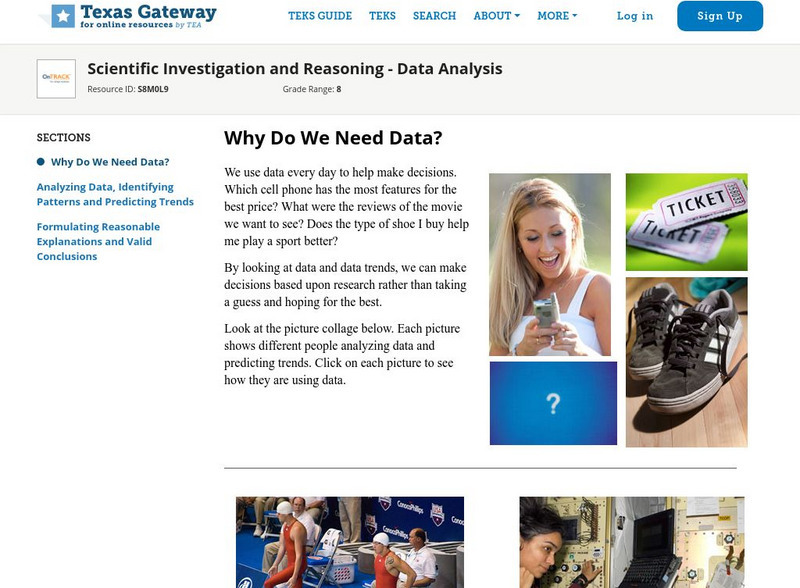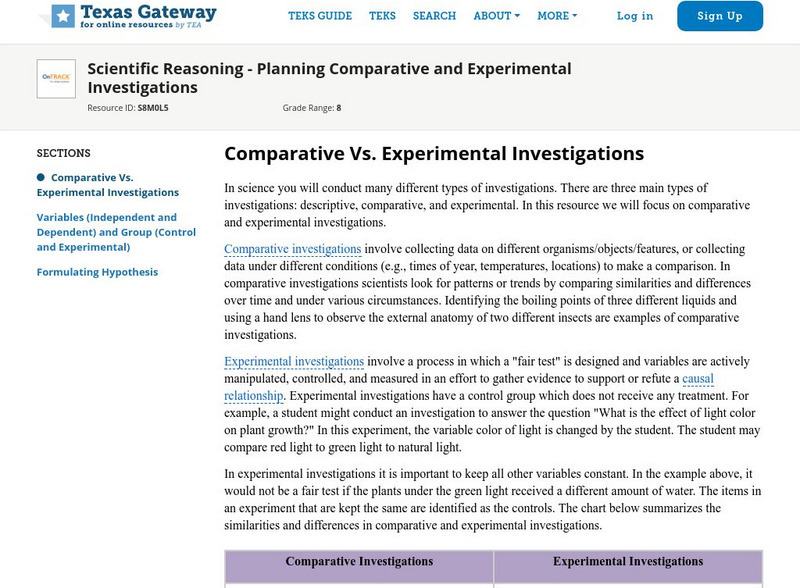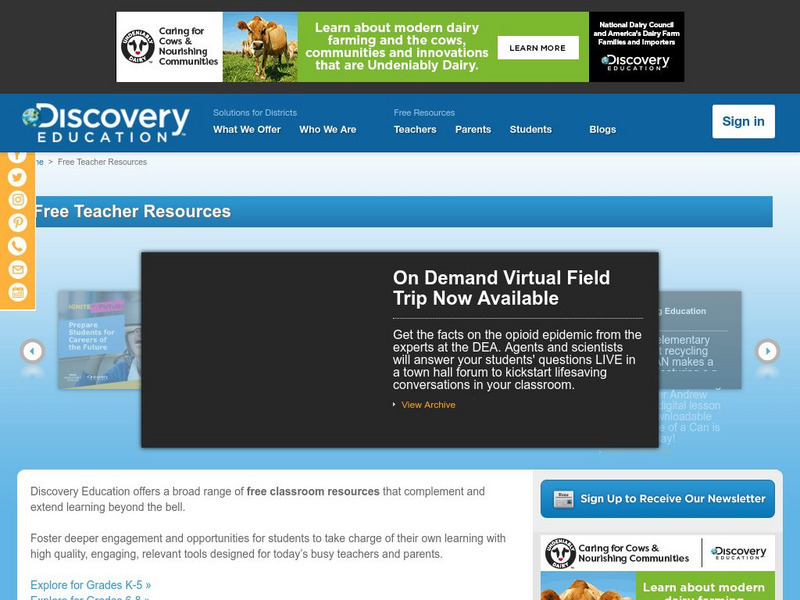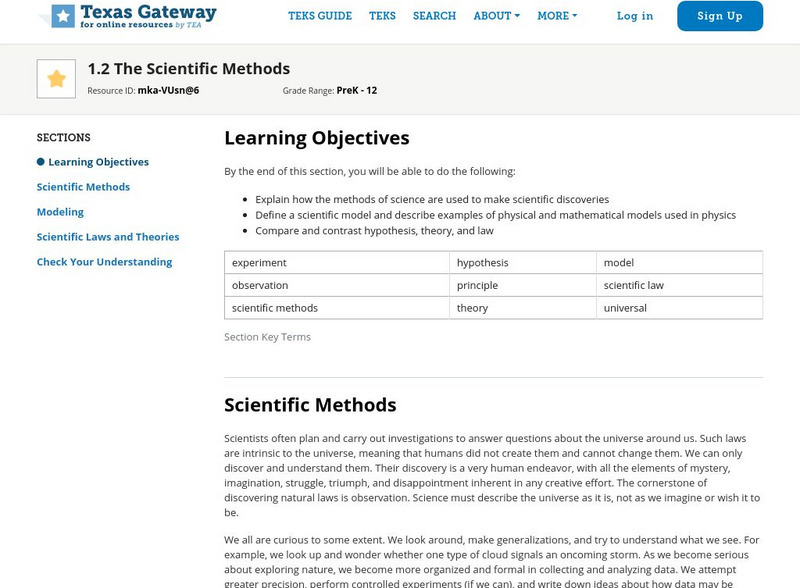CK-12 Foundation
Ck 12: The Scientific Method
[Free Registration/Login may be required to access all resource tools.] In this module, students study science and understand that it has limitations. Students also explore the scientific method and investigative procedures stemming from...
CPALMS
Florida State University Cpalms: Florida Students: Defining Science
Understand the scientific practices in this tutorial that defines what science is and isn't.
Texas Education Agency
Texas Gateway: Why Do We Need Data?
We use data every day to help make decisions. Which cell phone has the most features for the best price? What were the reviews of the movie we want to see? Does the type of shoe I buy help me play a sport better?By looking at data and...
Texas Education Agency
Texas Gateway: Descriptive vs. Comparative Investigations
In the following lesson students will learn the differences between descriptive and comparative investigations.
Texas Education Agency
Texas Gateway: Types of Science Investigations
This tutorial will describe the three types of scientific investigations: descriptive, comparative, and experimental.
Texas Education Agency
Texas Gateway: Scientific Reasoning
Do you know how to evaluate scientific information? This tutorial reviews how to read and interpret scientific research and information.
Texas Education Agency
Texas Gateway: Significant Figures
Given quantitative data, students will express and manipulate quantities using the correct number of significant figures.
Smithsonian Institution
Smithsonian Science Education Center: Science: A Work in Progress
The scientific method is more than just a series of steps to be followed like a recipe. It is a fluid, ever-changing process. This video discusses student's perception of the scientific method and how to make learning science in the...
Pennsylvania State University
Penn State Lehigh Valley: Scientific Investigation
This site presents a general overview of scientific investigation. Content explores what scientific investigation is, as well as the scientific method (the guidelines followed by all scientists).
Texas Education Agency
Texas Gateway: Scientific Reasoning Planning Investigations
Given scenarios of comparative and experimental investigations, students will plan and implement investigations by making observations and asking well-defined questions and formulating testable hypothesis.
Discovery Education
Discovery Education: Science Fair Central: Choose a Project Type Investigation
Discover how to approach a scientific question, and learn eight steps students will perform in doing so. Offers suggestions on how to ask a testable question as well as several examples.
Better Lesson
Better Lesson: Our Sky
What objects are in the day sky and the night sky? How do they seem to move? Come and explore with us as we discover the sun, moon, planets and stars! This detailed lesson plan includes pictures and videos of the lesson in action,...
Texas Education Agency
Texas Gateway: Physics: The Scientific Methods
By the end of this section, you will be able to explain how the methods of science are used to make scientific discoveries; define a scientific model and describe examples of physical and mathematical models used in physics; and compare...
Discovery Education
Discovery Education: Science Fair Central: Practice Investigation Virtual Labs
Two virtual labs offer practice for creating your own or science project: "How Does Your Garden Grow" and "Critters!" Learn how investigations are conducted from the first step to the finished product.
Other
National Geographic: Jason Learning
[Free Registration/Login Required] Educators and students will enjoy visiting the JASON Project, a NASA and National Geographic cooperation which works to provide accurate and intriguing scientific knowledge for students.
University Corporation for Atmospheric Research
Ucar: Elementary Globe: Earth System in a Bottle
If you have seeds at home, try this activity to help kids learn what a seed needs to grow. Students will create experimental conditions in terrariums to study what plants need to live. They will learn about the importance of the...
South Carolina Educational Television
Know It All: Microscope | Hobby Shop
In this activity, students use a virtual biology lab to perform investigations and learn lab procedures using compound and dissecting microscopes to look at a variety of animal and plant cells.
PBS
Pbs Kids: Elinor Wonders Why: Elinor's Nature Adventure
Come explore with Elinor! Use the tools provided to observe your environment as you take a nature walk. What will you find?
University Corporation for Atmospheric Research
Ucar: Virtual Ballooning to Explore the Atmosphere Activity
In this computer-based virtual lab, students will learn about the layers of Earth's atmosphere by launching virtual balloons to collect temperature and pressure data at various altitudes. Given a limited number of balloon flights,...
BSCS Science Learning
Bscs: Restoring Oyster Reefs
After learning about the role of oysters in an estuary ecosystem and a population decline that oysters have faced over time from overharvesting and pollution, students work with data to determine where are ideal sites for restoring...
BSCS Science Learning
Bscs: Budburst Fall Colors
In this Inquiry, students engage in a debate between two characters about when a bed-and-breakfast (B&B) should have a fall leaf-peeping special to maximize the guest experience. Students are introduced to Budburst, a citizen science...
BSCS Science Learning
Bscs: Restoring Oyster Reefs
After learning about the role of oysters in an estuary ecosystem and a population decline that oysters have faced over time from overharvesting and pollution, young scholars work with data to determine where are ideal sites for restoring...
BSCS Science Learning
Bscs: Globe at Night Dark Skies
In this inquiry, students predict the best place to stargaze in Arizona based on the brightness of the night sky. Students are introduced to the concept of light pollution and Globe at Night, a global citizen science project in which...
BSCS Science Learning
Bscs: Global Night Sky Comparison
This inquiry invites students to investigate human impacts on the environment. Specifically, students will examine the relationship between human population, light pollution, and how brightly celestial objects like stars appear in the...

















